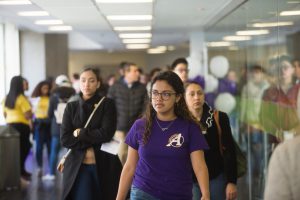
Hunter’s sky bridges were often populated by student tour guides showing off the campus to prospective students. That is until the pandemic struck.
When Governor Cuomo made dramatic cuts to the state budget in April, Hunter was one of CUNY’s 25 institutions forced to lay off thousands of adjuncts across departments. The administration was also unable to reappoint college assistants, who led the tours among other things, for the summer. There was upheaval in Hunter’s art department this past summer when 30 of the college assistants almost lost their contracts. Now, student college assistants want to know how Hunter’s administration was able to afford the appointment of 10 new faculty members in September following the layoffs.
Hunter College hired 10 new faculty members following layoffs of college assistants and adjuncts. Students want to know how and why they chose to do it now. “They’re choosing to hire these distinguished lecturers and just leaving thousands of people without health insurance in the middle of a pandemic,” said Marc Roy, a former Hunter tour guide and junior Macaulay Honors student at Hunter.
Governor Cuomo’s cuts to CUNY’s budget resulted in almost 3,000 adjuncts being laid off across the schools, leaving students and staff alike upset. The Professional Staff Congress, the union responsible for representing CUNY’s staff, did not respond to comment on the layoffs or their effects on the Hunter community, though they held a rally at school on October 15, calling for a reversal of the cuts.
Roy, a nonbinary media studies and urban studies double major, was one of the college assistants whose job was put on hold for the summer. They had been making $15 an hour leading tours for prospective students throughout the campus before the school shut down to prevent the spread of COVID-19. Once the switch to online learning was made they were only paid for the occasional task they were assigned during the first few weeks. Then, as Hunter’s fiscal year came to a close, they were informed that everyone was being let go for the summer until the budget was announced.

“It didn’t even feel like a firing, it felt like, just wait and we’ll let you know what happens,” said Roy. They used to enjoy leading tours around campus, passing on their wisdom to high schoolers and prospective students visiting with their families. While Hunter did ultimately offer them and a few of their coworkers positions doing virtual tours during the fall, Roy decided to turn it down. For Roy, virtual tours were a sorry, if necessary, replacement for the in-person tours they used to give on campus.
Roy, like other Hunter students, said they couldn’t understand why Hunter’s administration chose to appoint the new faculty members now, given the budget cuts and layoffs. They said they’d have preferred if Hunter had rehired adjuncts instead of older professors who might struggle with online learning applications like Zoom or Blackboard. They also expressed a desire for more diversity to the faculty. “If it were all Black professors being added to the Black Studies department then I’d go, ‘Oh yeah, honestly good move, Hunter’ but that’s not the case,” said Roy. The 10 new hires filled roles in the School of Arts & Sciences and the Silberman School of Social Work; among the new appointees were experts in the latest methods and research in their respective fields, though only two are African American and none were additions to the Black Studies department.
According to Hunter’s Assistant Vice President for Communications Bob de Luna, the staffing decisions had already been in the works before the school moved to online learning. “Those commitments were made before COVID and before the financial stressors,” said de Luna. He said that the contract negotiations for the staff additions had happened months beforehand. Some of the appointments filled vacancies that the departments couldn’t function without, while other positions already had funds allocated to the fulfillment of the position.
De Luna said that the appointment of new staff members was done specifically with the futures of Hunter students in mind. De Luna says that their appointments were necessary to best prepare Hunter students for their careers. “These decisions are thinking about Hunter students’ future careers,” says de Luna. According to de Luna, the success of Hunter’s students is still of the utmost importance, even despite the financial challenges facing CUNY. “We want to make sure that students are ready to work and have good chances at getting the job they really want in the workplace,” he said.
